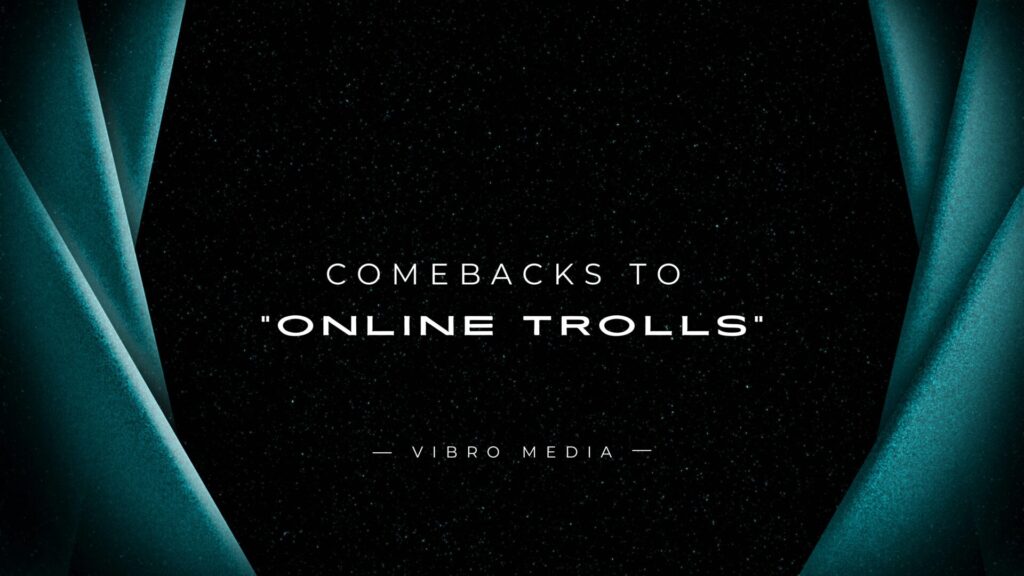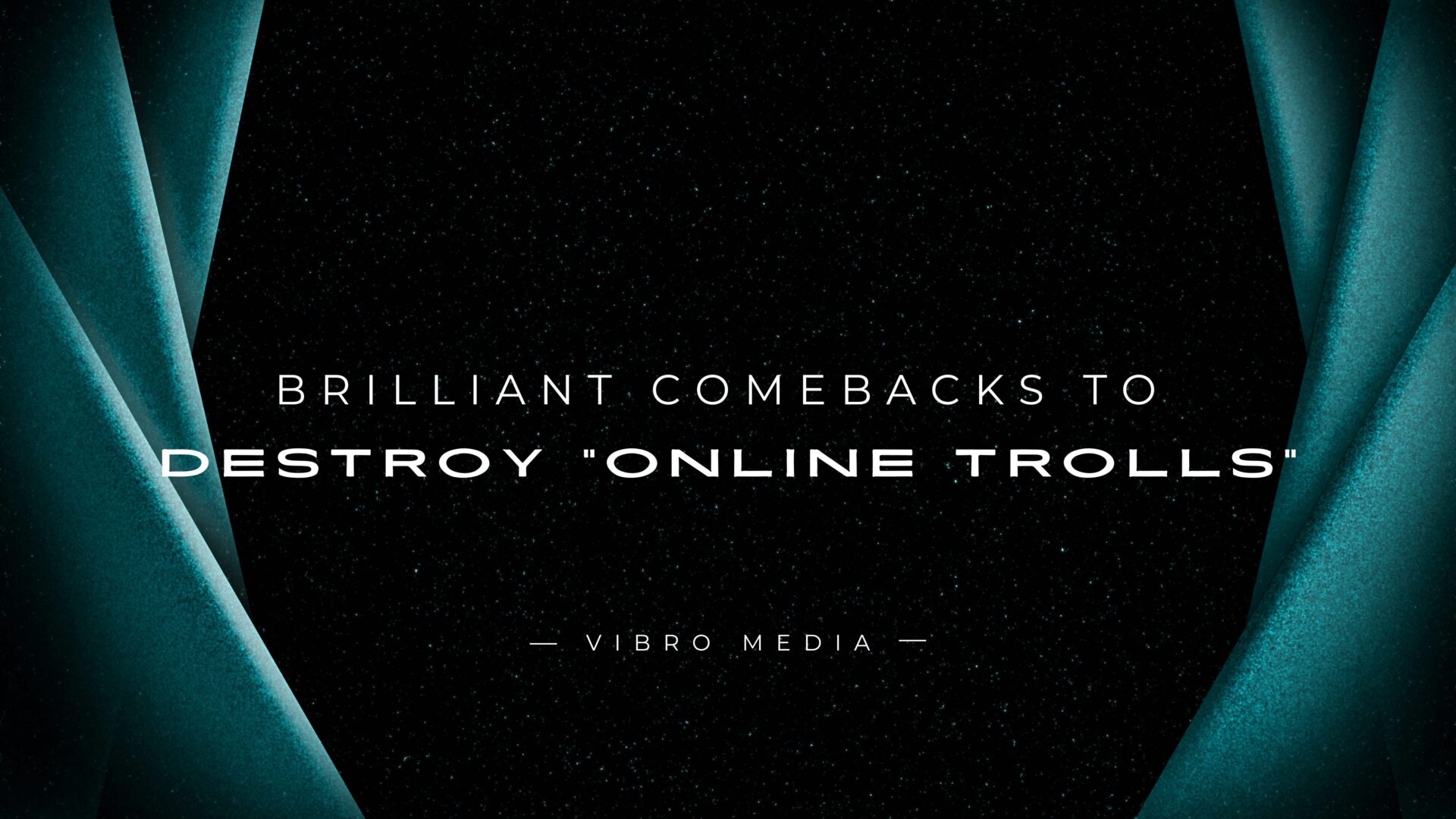Online trolls are individuals who deliberately provoke and upset others on the internet. They thrive on the chaos they create, whether it’s through inflammatory comments, offensive memes, or disruptive behavior in forums and social media. Picture a mischievous child pulling the legs of others at a party—trolls are the adults who just never grew out of it, seeking attention at the expense of someone else’s peace.

200+ Comebacks to “Online Trolls”
Humor
- I see you’ve brought your A-game to the keyboard. It’s too bad it’s a C.
- If I had a penny for every troll, I’d be rich enough to buy a real friend.
- Your comment is like a participation trophy—thanks for playing, but it doesn’t count.
- I’d respond, but I don’t speak ‘troll.’ Can you translate that for me?
- Your keyboard must be magic; it turns your thoughts into nonsense!
- You must have a PhD in trolling with those advanced techniques!
- Is this a troll comment or a cryptic riddle? I can’t tell.
- I appreciate the effort! Did you write that yourself, or did you have help from Google?
- I’d laugh, but I’m too busy figuring out if you’re serious.
- You know what they say: troll them if you can’t beat them!
Sarcasm
- Oh wow, thank you for your valuable insight. Truly life-changing!
- I didn’t realize I was talking to the authority on everything.
- Your expertise is astounding. I can’t believe you’ve kept it a secret this long!
- You should write a book on how to be unhelpful.
- How kind of you to drop such wisdom in my comment section.
- Please, keep talking! This is the best comedy show I’ve seen in ages.
- Thanks for your unsolicited advice! I’ll file it under ‘Ignored.’
- I’m just here for your brilliant comment; you are on a roll!
- Is this the part where I’m supposed to be impressed?
- You’ve mastered the art of constructive criticism!
Intelligence
- Interesting opinion! Have you considered the facts before sharing?
- I admire your confidence in being so wrong.
- Your logic is like Swiss cheese—full of holes.
- That’s an intriguing viewpoint, but it doesn’t hold under scrutiny.
- It’s fascinating how you twist logic to fit your narrative.
- I’m curious how you arrived at that conclusion. It defies common sense.
- Your argument lacks empirical evidence. Do you care to provide some?
- If I followed your reasoning, I’d be lost in a maze of misconceptions.
- I appreciate the creativity in your logic, but it needs to add up.
- It’s remarkable how you can fit so many inaccuracies into one comment.
Confidence
- I appreciate your thoughts, but I’m confident in my own choices.
- Your negativity doesn’t shake my resolve; I’m doing just fine.
- Keep talking! It only solidifies my belief in my path.
- I’ve found that my success is the best response to trolls like you.
- Your opinion is noted, but it won’t change my course.
- I’m too busy thriving to pay attention to the negativity.
- Your comments reflect more about you than they do about me.
- I’m proud of who I am; your words can’t change that.
- Thank you for your feedback! It reminds me to stay focused.
- Your trolling just motivates me to continue being awesome.
Dismissive
- I don’t engage with negativity; it wastes my time.
- Noted. Now, let’s move on to something worthwhile.
- Your comment is as relevant as yesterday’s news.
- I’ll let that one slide; it’s not worth my energy.
- Thanks for your input, but I’m tuning out the noise.
- I’m not here for drama, so let’s keep it moving.
- That’s cute! Now, back to reality.
- I’d love to chat, but you seem too bitter for my taste.
- This isn’t a forum for trolling; it’s a space for constructive conversation.
- I’m not here to argue with shadows. Bye!
Facts and Logic
- The data shows an entirely different story.
- Research suggests otherwise; it’s interesting how facts can change opinions.
- Let’s not forget the evidence supporting my stance.
- If we look at the facts, your argument needs to be revised.
- You should check your sources; they seem outdated.
- Logic dictates that your viewpoint doesn’t hold up against reality.
- It’s surprising how misinformation spreads so quickly.
- The statistics clearly illustrate a different perspective.
- Let’s base this conversation on facts rather than feelings.
- Your argument is more emotional than factual; let’s stick to the truth.
Encouraging Engagement
- I’d love to hear your reasoning behind that comment!
- What would be a better approach?
- Please share more of your thoughts; I’m curious to understand.
- It’s always good to have different viewpoints. What’s your solution?
- Engagement is key! What else do you think about this topic?
- You’ve got my attention; let’s dig deeper into your thoughts!
- I appreciate your input! What would you suggest instead?
- I’m open to discussion! What’s your main point?
- Let’s turn this negativity into a constructive conversation!
- Your perspective is interesting. How would you improve the situation?
Personalization
- Wow, it’s impressive how well you think you know me. What else do you have?
- Are you sure you’re not just projecting your issues onto me?
- It’s cute how you think your opinion matters to my life choices!
- I didn’t realize I was getting a personal assessment from you today!
- I appreciate your concern for my life. You must care!
- Wow, a troll with insight! Tell me, do you have a crystal ball?
- You must have been watching me closely! How flattering!
- That’s an interesting perspective for me. How did you come to that conclusion?
- Thanks for your unsolicited advice! I’ll take it under advisement.
- I didn’t realize you were my life coach! What’s next on your agenda?
Empathy
- It sounds like you’re having a tough day. Want to talk about it?
- I can see you’re passionate about this. Let’s channel that energy positively!
- I hope everything is okay on your end; your comment sounds frustrating.
- It must be exhausting to carry around all that negativity. I hope you find peace!
- I can feel the pain behind your words. Want to share what’s bothering you?
- We all have our moments. I hope you find a way to express yourself more positively.
- I get it; sometimes, we all just need to vent. I hope you’re okay.
- Your words reflect a lot of inner turmoil. I hope you find some resolution.
- It sounds like you’re struggling with something. I’m here if you need to talk!
- Everyone has off days. Let’s focus on spreading a little kindness instead!
Professionalism
- Thank you for your input; however, I prefer to focus on constructive dialogue.
- I appreciate your perspective, but I’m here to promote positivity and growth.
- Let’s keep the conversation respectful. I value productive discussions.
- I’ll consider your feedback as I continue my work.
- While I appreciate your passion, I aim to keep this platform professional.
- Thanks for sharing! I’ll focus on my objectives while you focus on yours.
- Let’s maintain a professional tone as we discuss this topic.
- Your comment is noted, but I’ll prioritize constructive feedback over negativity.
- I strive for a positive environment here; let’s work towards that.
- Thank you for your thoughts. I prefer to keep discussions uplifting and professional.
Irony
- It’s funny how trolls claim to seek the truth while hiding in the shadows.
- Your negativity is indeed a paradox in the pursuit of happiness!
- Ironically, you think trolling will earn you respect.
- Isn’t it amusing how some people think insults make them superior?
- The irony of your comment is almost poetic; thanks for the laugh!
- It’s rich coming from someone who’s never seen the light of day.
- You say one thing but act another; it’s pretty ironic, don’t you think?
- You’re an expert in irony—too bad it doesn’t come with wisdom.
- Your approach is a classic case of ‘do as I say, not as I do’!
- How ironic that your attempt to insult only highlights your insecurities.
Referencing Common Knowledge
- As they say, ‘Haters gonna hate.’ Thanks for proving that point!
- Remember the saying, ‘If you don’t have anything nice to say…’?
- We all know trolls thrive on negativity, but it doesn’t bother me!
- It’s a classic move to troll someone doing well; you’re right on cue!
- Just like history has shown, trolls never get the attention they crave.
- There’s a reason they say, ‘Sticks and stones may break my bones…’
- I see you’ve mastered the age-old art of trolling! Congratulations!
- Like they say, ‘Everyone is a critic!’ But I prefer constructive feedback.
- We’ve all heard the adage: ‘Consider the source.’
- Your comment is a textbook example of trolling. Well I, mone!
Encouraging Reflection
- Have you considered how your words affect others? Just a thought!
- What do you think you’re trying to achieve with that comment?
- Is this the legacy you want to leave in your online presence?
- Take a moment to reflect on why you need to troll.
- What would you say to someone who spoke to you like you did?
- Could your time be better spent doing something productive instead?
- How will others perceive your commencement commenting to get your point across? I’m curious.
- What motivates you to engage this way? It’s an interesting question.
- If you took a step back, would you still feel the same about your comment?
Clever Wordplay
- I’d call you a tool, but that implies you’re helpful!
- You seem to be on a roll—too bad it’s downhill!
- That’s an interesting perspective! Let’s put it in the ‘what not to do’ file.
- Your words are like a double rainbow—pretty but meaningless!
- I’d respond to your comment, but it’s all too trolly for my taste.
- You must be a magician because your logic disappears!
- Is your keyboard broken? Because that comment is an absolute mess!
- I’m not saying you’re clueless, but you gave ‘lost cause’ a whole new meaning!
- You’ve got some great one-liners, but they’d be better if they made sense!
- I see you’ve mastered the art of saying nothing with flair!
Confidence Boost
- Thanks for the motivation! Your negativity just fuels my fire.
- I appreciate your comment; it reminds me how far I’ve come!
- Your trolling is an excellent reminder of why I keep pushing forward.
- Every troll is just a stepping stone to my subsequent success. Thanks for being one!
- Your negativity only strengthens my resolve to keep shining.
- I’m glad you’re paying attention; it means I’m doing something right!
- Your attempt to bring me down only lifts me higher. Keep it coming!
- I must be doing something good if I’m attracting this much attention!
- Your words inspire me to keep chasing my dreams. Thank you!
- I’m on the right path if I’m stirring up such reactions!
Curiosity
- I’m intrigued! What experiences led you to such a strong opinion?
- I’d love to understand your viewpoint better. Care to explain?
- What’s your story? I’m curious about what motivates your comments.
- You’ve got my attention! What’s your reasoning behind that statement?
- It’s interesting how you view things. What made you think that way?
- I’d love to hear more about your perspective. What’s the basis of your argument?
- What would improve this situation? I’m all ears!
- I’m curious—what do you hope to achieve by trolling me?
- How could I better my approach based on your opinion?
- Your viewpoint is fascinating! What experiences shaped it?
Historical Reference
- Like in ancient times, trolls have always been around; some things never change!
- It reminds me of the adage: ‘Foolishness is timeless.’
- History shows that trolls only seek attention, and they rarely get respect.
- As we’ve seen throughout history, significant figures often faced criticism from the uninformed.
- Remember the tale of the three little pigs? Not all structures can withstand the huffing and puffing of trolls!
- History is full of naysayers who eventually faded into obscurity—don’t follow their path!
- It’s like watching a reenactment of ancient trolls trying to drag down the wise.
- Just like Socrates faced ridicule, I’m honored to be in good company!
- In history, the greatest minds were often attacked. Keep the tradition alive!
- You remind me of the court jesters of old—here for the laughs but not taken seriously.
Challenge
- I challenge you to come up with something constructive next time!
- How about you share an actual opinion instead of just trolling?
- Why don’t you show us if you think you can do better?
- I challenge you to find a better way to express your thoughts!
- I bet you can’t create a single positive comment—try it
- Let’s make this enjoyable: can you formulate a valid argument?
- I challenge you to back up your claims with some facts!
- Can you provide a different perspective instead of just negativity?
- Why don’t you step up and offer a solution instead of criticism?
- I’d love to see you take on a positive challenge. Ready?
Philosophical
- What is the purpose of your comment? Is it to enlighten or to diminish?
- If we look deeper, is your comment a reflection of you or me?
- Isn’t it interesting how we often project our insecurities onto others?
- As the philosopher said, ‘Know thyself.’ What do you truly know?
- What’s more important: being right or being kind?
- Is there wisdom in your words, or just noise? Let’s explore that.
- If a tree falls in the forest and a troll comments, does it matter?
- Every opinion is shaped by experience. What experience shaped yours?
- What can we learn from criticism? It’s a question worth pondering.
- Do we focus more on our truth or others’ judgments as we navigate life?
Inspirational
- Your negativity reminds me to keep pushing for positivity in the world!
- I’m inspired to rise above, thanks to your uninspired comments!
- Every troll is just another reminder to spread kindness and light!
- Your words motivate me to continue being a source of positivity!
- For every troll, countless supporters are cheering me on!
- I believe in spreading love, even to those who try to tear it down.
- Your attempt to troll only fuels my passion for making a difference!
- I’m on a journey, and your comments are just bumps along the road!
- Every negative comment is just a reminder to focus on the positive!
- I choose to rise above and inspire others to do the same.
The Psychology Behind Trolling
But why do they do it? Research suggests that trolling can stem from a need for validation, feelings of power, or even deep-seated insecurities. It’s a way for some people to express their frustration or boredom. Like someone might throw a rock into a still pond to watch the ripples, trolls seek the reactions that ensue from their provocations.
Why Do Trolls Target People?
- Motivations Behind Trolling
The motivations behind trolling can vary widely. Some trolls aim for laughs at others’ expense, while others may have more malicious intent, seeking to harm or distress their targets. It’s like a digital version of bullying, where the anonymous nature of the internet allows individuals to feel emboldened. The thrill of seeing someone react—whether it’s anger, frustration, or sadness—feeds the troll’s appetite for attention.
- Common Targets of Trolls
Trolls often target public figures, activists, or anyone who shares their opinions online. This could include bloggers, influencers, or everyday people expressing personal views. If you’ve ever noticed someone receiving an absurd amount of negativity for simply sharing a thought, they might face the wrath of online trolls.
Recognizing the Signs of Online Trolls
- Characteristics of Troll Behavior
Understanding troll behavior can help you identify them more effectively. Trolls often use provocative language, spread misinformation, and engage in personal attacks rather than constructive criticism. They may repeat the same argument, refuse to acknowledge counterpoints, and aim to derail conversations. Their goal? To elicit an emotional response from you.
- Differentiating Between Trolls and Critics
It’s crucial to distinguish between trolls and genuine critics. While a critic might offer constructive feedback, a troll will resort to insults and baseless arguments. Think of it like this: a critic might point out flaws in your work to help you improve, while a troll throws shade just to watch you squirm. Knowing this difference can help you choose how to respond appropriately.
Preparing for Online Trolling
- Setting Up Privacy Settings
Before engaging in online discussions, setting up your privacy settings is wise. Many platforms allow you to control who can see your posts, comment on them, and contact you. Ensure you know and use these tools to create a safer online environment. Liking your doors at night, privacy settings can act as a barrier against unwanted intrusions.
- Building a Support Network
Having a solid support network can provide a buffer against trolling. Friends, family, or fellow online users can help you navigate negativity and provide emotional support. It’s like having your team of cheerleaders ready to lift you when trolls try to bring you down.
Strategies for Responding to Trolls
- Ignore the Trolls
Sometimes, the best response is no response at all. Ignoring trolls can frustrate them even more than engaging. After all, if they’re not getting the reaction they crave, they might just move on to find a more responsive target. Picture them like a child throwing a tantrum; ignoring them might be the most effective way to stop them.
- Engage Constructively
If you feel up to it, consider engaging with trolls constructively. This doesn’t mean you must accept their behavior, but sometimes, appeasing their emotions can disarm them. For instance, if a troll criticizes your point, calmly state your perspective without resorting to insults. This can sometimes turn the tables, making them look petty.
- Use Humor to Deflect
Using humor can also be an effective tool against trolls. A well-placed joke can lighten the mood and show that you’re not easily rattled. Think of it as using a shield of laughter to protect yourself from their negativity. Plus, humor often leaves trolls confused, which can be pretty entertaining.
- Report and Block
Don’t hesitate to report and block trolls. Most platforms have features to help you deal with harassment effectively. Reporting them sends a clear message that their behavior is unacceptable. Blocking them is like putting up a “Do Not Enter” sign; it’s your space, and you control who’s allowed in.
The Long-Term Effects of Trolling
- Impact on Mental Health
Acknowledging that trolling can have lasting effects on mental health is essential. Constant exposure to negativity can lead to anxiety, depression, and a sense of isolation. It’s crucial to take care of your mental well-being by engaging in self-care and seeking support when needed. Just as we wouldn’t ignore physical injuries, we must pay attention to our emotional wounds as well.
- Building Resilience Against Trolls
Developing resilience is critical to handling online trolls effectively. This means cultivating a mindset that allows you to rise above negativity and not let it define your online experience. Engage in positive activities, surround yourself with uplifting people, and remember that trolls often project their issues onto others. You can build mental armor against their insult by focusing on your strengths.
Conclusion
In conclusion, dealing with online trolls can be smooth and easy. Armed with these 200+ brilliant comebacks, you can quickly shut down negativity and even add a bit of humor to the situation. Remember, the key is to stay calm, clever, and in control of the conversation. If you’re also dealing with rude people, check out our 200+ Comebacks for When Someone is “Being Rude” guide here. It’s packed with even more sharp responses to handle difficult situations confidently!
FAQs
Q. How can I tell if someone is a troll?
Trolls typically engage in inflammatory or disruptive behavior, making personal attacks rather than offering constructive feedback. Someone who consistently tries to provoke or upset others without meaningful discourse might be a troll.
Q. What should I do if I’m being trolled?
You have several options: ignore the troll, respond calmly, use humor, or report them to the platforIt’st’s essential to prioritize your mental health and well-being above all.
Q. Is it worth responding to trolls?
In most cases, it’s better to ignore them. However, if you feel equipped to engage constructively, you can respond calmly to counter their negativity.
Q. Can trolls affect my online reputation?
Yes, trolls can attempt to tarnish your reputation, mainly if they spread false information. Maintaining your integrity and responding thoughtfully is vital, whether clarifying misinformation or ignoring unfounded attacks.
Q. How can I protect myself from online trolls?
Set strict privacy settings, build a supportive online community, and learn to identify troll behavior to help create a safer online experience for you.










